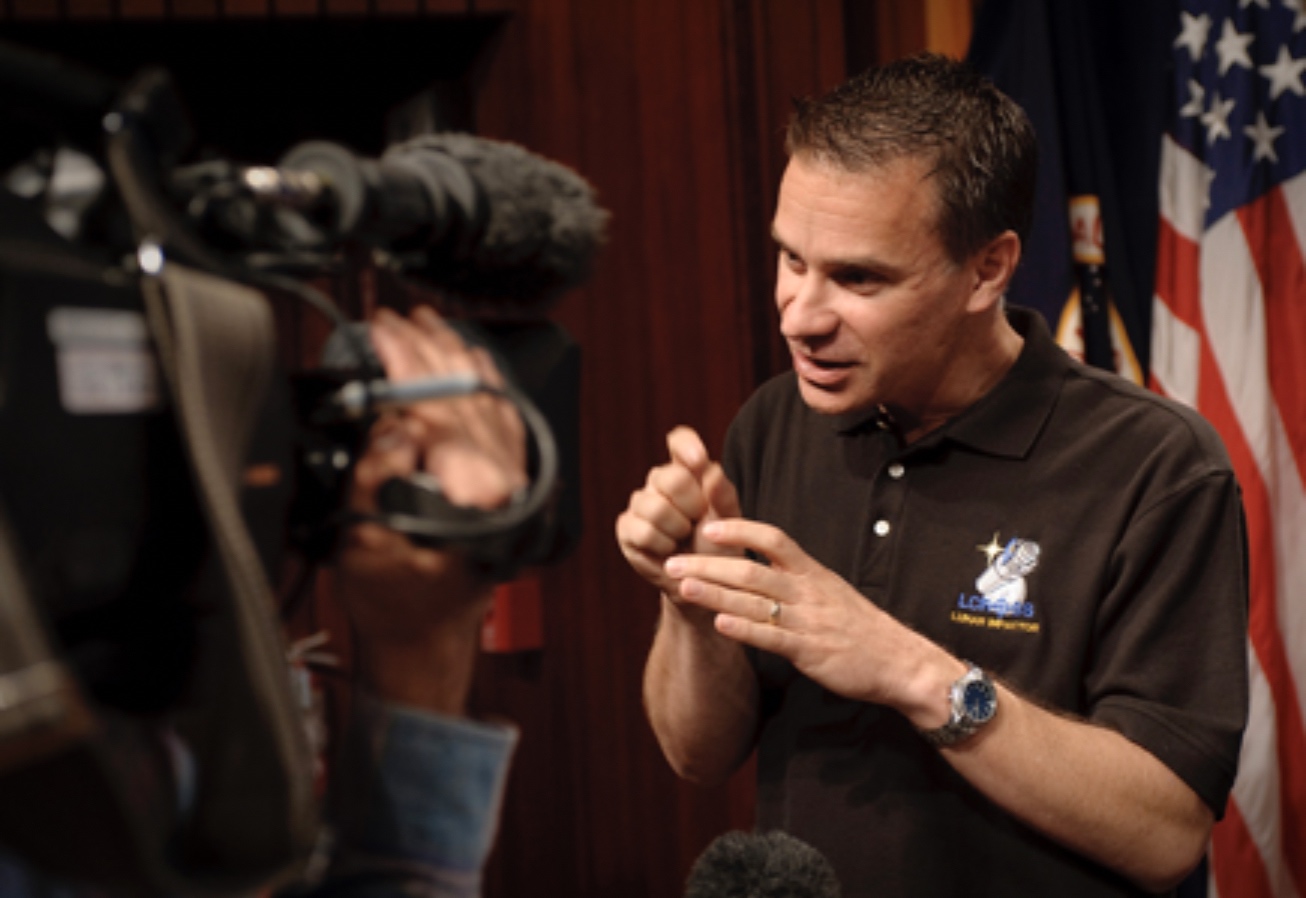
Daniel Andrews
Project Manager - NASA Ames Research Center
Daniel Andrews is the project manager for NASA's planned Volatiles Investigating Polar Exploration Rover (VIPER) as Ames Research Center in California’s Silicon Valley. VIPER is NASA's first robotic lunar rover. Dan has managed projects at NASA for more than 30 years, designing and developing technological innovations for projects focusing on everything from autonomous robots to underwater treadmills that simulate microgravity. Dan also led the Lunar Crater Observation and Sensing Satellite, or LCROSS, mission that confirmed the presence of water ice at the Moon's South Pole, paving the way for the VIPER mission. To balance his NASA workday, Dan enjoys rethinking and flipping old furniture and architectural items into great new pieces

I was raised in Livermore, CA, but I have spent my adult life in San Jose, CA, with my wife, where we raised three kids.
I was too young to remember the Apollo program as it was unfolding, but clearly it shaped everything that became NASA as we know it today. My first really meaningful, heartfelt space moment came when I got to see a shuttle launch from Cape Canaveral. I can still remember the feel of the thunderous roar and the very surprising high-pitched crackling sound as the launch vehicle tore through the atmosphere. I remember feeling a deep sense of pride, not just as an American, but pride in what we humans can accomplish with focus and purpose. It took my breath away.
While I was getting my bachelor's degree in electrical engineering, I was approached by one of my professors, who had been visited by a former student who was working at NASA-Ames Research Center (ARC). The professor explained to me that there was an opportunity at NASA for a controls/automation engineer and he recommended me for the job. I followed through with an interview and was offered an engineering position. The decision didn't require much pondering and I have never regretted it.
At an early age my dad, a physicist and tech hobbyist, got me interested in building kits and later, programming. We would build various electronic kits and even a Sinclair computer where I got my first taste of programming. He helped me imagine all the things you could do with a computer. I found myself rushing through schoolwork in order to try programming techniques to make graphical objects appear on that computer screen. Once I mastered getting shapes on the screen, I moved to groups of objects, and one thing led to another and I had programmed a home version of the arcade game, "Space Invaders." That also led to my first taste of needing more horsepower from your computer! ... a realization I would have over and over again in life. Building on that early learning, I wondered how this computer could control objects in the physical world. Soon I was imagining primitive robotics applications. I would later create automatic vertical blinds controllers that tracked the sun, as well as all kinds of car gadgets. On and on it went with me conjuring devices and contraptions, all inspired by those early days watching and learning from my dad.
The role of a project manager (PM) is similar to that of an orchestra conductor. A conductor does not play an instrument; instead his job is to look ahead on the sheet music and guide the musicians. The PM's sheet music is his project plan and he needs to make sure everyone is on the same page, while listening for necessary adjustments. He is always looking out for the best interest of the symphony and its performance.
I view project management as helping a group of capable people get something meaningful accomplished.

Daniel andrews
VIPER Mission Project Manager
I came to project management as an experienced engineer who had always worked on teams. Before I became a project manager I noticed that the people I enjoyed working for the most, were the ones who allowed me ownership of my work and who cleared away obstacles so that I could do my job. This is one of the most-importance facets of leadership. I did not have to always agree with the direction the leader was taking, but I wanted to know my opinion was heard. I also needed to know someone “had their hand on the steering wheel” and would be decisive. This experience evolved my view of the type of project manager I would try to be: I view project management as helping a group of capable people get something meaningful accomplished. Some project managers take pride in being the face of the group, but I have a far more pragmatic view. All members of a project team have a role, including the project manager. All of us together are moving toward an end goal.
Sitting in Mission Control at Cape Canaveral and sending the Lunar CRater Observation and Sensing Satellite (LCROSS) on its way to the Moon ranks pretty high as a favorite moment for me. Just as meaningful as the technical accomplishments are the great pride in watching a team enjoy their success and getting much-deserved appreciation at a "Family Appreciation" event we held for the team. The event, hosted by NASA-ARC senior management, was about as good as it gets. The Center Director, Deputy Center Director and the executive management team made speeches of appreciation to the family members of the LCROSS team who were present. All the family members were given special tours and special treatment for the evening. It was a moment of great pride to see all the people whose spouses/parents had been working long hours on the LCROSS mission, receive gratitude from the leadership of the Research Center.
Having an engineering background is essential when leading a technical activity, but not every engineer makes for a good project manager. It’s a good idea for prospective PM’s to try project management on a smaller scale by leading smaller teams, working on relatively short projects and seeing if you find it rewarding, and see if you’re effective. This will also give you the chance to improve/grow your project management skills, because like engineering itself, you continue to grow and learn as you go.
I enjoy hiking, biking and jogging. Our family makes regular camping treks in the summer to do miles of hiking on the granite. We take local hikes in the hills of northern California as well. Life balance is not always easy and sometimes you find yourself "out of balance" for a while, but it is important to always to look to where you want to be and to actively steer in that direction.
Think both broadly and with focus. Find passion in specific technical areas, but also have good, working knowledge in other areas. As you move into leadership positions, the problems are diverse, and having a broad knowledge base will serve you in ways you may not yet realize.
